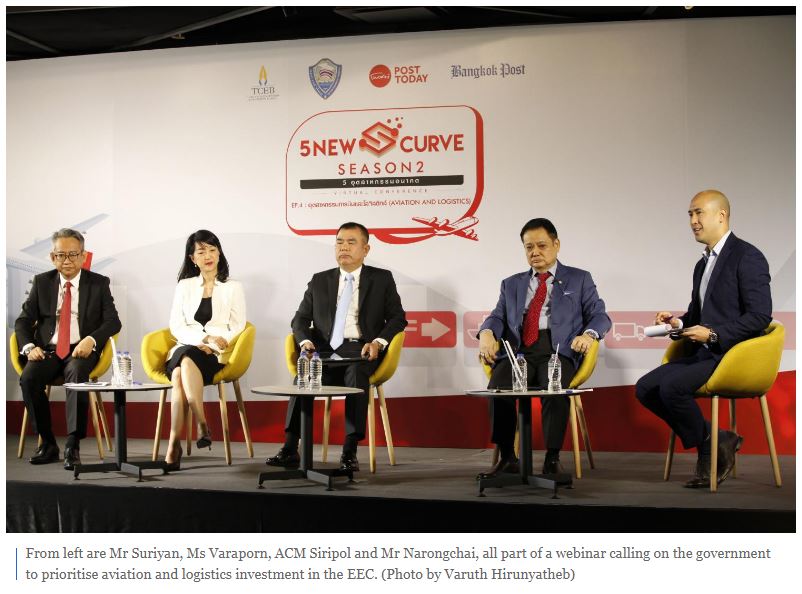Thailand: EEC holds promise as aviation hub
Thailand has an opportunity to become an aviation and logistics hub, thanks to its prime location in central Southeast Asia and infrastructure development in the Eastern Economic Corridor (EEC), but the country needs to adjust to the pandemic crisis.
The severe impact of the pandemic on aviation and tourism firms as well as a delay in developing a maintenance, repair and overhaul (MRO) centre at U-tapao airport in Rayong means the government needs to come up with solutions to improve investment sentiment at the EEC, said former energy and commerce minister Narongchai Akrasanee.
More robust investment will support the aviation and logistics sectors as the government aims to build a high-tech industrial hub, he said. Mega-projects like U-tapao aviation city, the MRO centre and a high-speed railway linking three airports are essential to EEC development.
“The aviation and logistics industries are important to our domestic economy,” Mr Narongchai told a webinar titled “5 New S-Curve 4: Aviation and Logistics” co-organised on Thursday by the Thailand Convention and Exhibition Bureau, the Thai Chamber of Commerce, the Bangkok Post and Post Today.
ENERGISING LOGISTICS
Thailand should take advantage of growing e-commerce during the pandemic to expand logistics investment.
“The government should link e-commerce and GMS together,” Mr Narongchai said, referring to goods transport in the Greater Mekong Subregion, covering Thailand, Myanmar, Laos, Cambodia, Vietnam and southern China.
Suriyan Vichitlekarn, executive director of the Mekong Institute, said he believes GMS will help make Thailand an aviation and logistics hub.
“Logistics in GMS is growing because of large populations and economic growth. E-commerce will further drive logistics business forward,” he said.
Tanit Sorat, vice-chairman of the Employers’ Confederation of Thai Trade and Industry, called on the government to help small and medium-sized enterprises (SMEs) in the logistics sector because they are swamped by the impact of the pandemic. Some 70-80% of Thai logistics businesses are operated by SMEs, he said.
BRACE FOR CHALLENGES
Woranate Laprabang, chief executive of Thai Vietjet, said in the next 6-12 months, many locations such as Singapore, Hong Kong and Taiwan can take advantage of their fast vaccination pace to allow business negotiation or create travel bubbles with select countries to help their economies recover.
With only 10% of Thais likely to be vaccinated by mid-year, the government must speed up vaccine distribution at tourism destinations, which in turn should join the sandbox to test quarantine-free travel for inoculated tourists, he said.
Airlines can survive by preserving cash flow, starting debt negotiations with aircraft lessors and lowering costs, said Mr Woranate. They must manage risks by diversifying into catering, e-commerce, ground handling and MRO, especially at the new aviation hub planned for U-tapao airport.
Air Chief Marshal Siripol Sirisabya, former chief executive of Thai Aerospace Industries, said aviation needs more skilled workers when air transport resumes to ensure safety. Aviation and logistics need to be added to the national agenda, with a budget for infrastructure development, collaboration with companies, and attracting foreign investors, he said.
Varaporn Dhamcharee, managing director at exhibition organiser Reed Tradex, said events and trade shows need more digital elements to match local and foreign businesses.
Source: https://www.bangkokpost.com/business/2086035/eec-holds-promise-as-aviation-hub


 Thailand
Thailand




